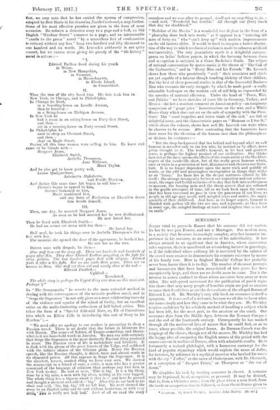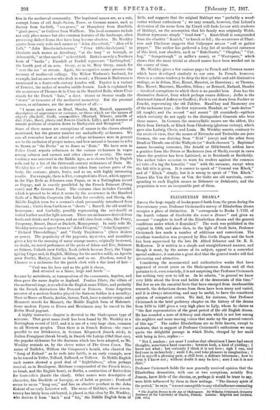SURNAMES.*
JULIET tried to persuade Romeo that his surname did not matter. To her he was just Romeo, and not a Montague. But modern man, in a society that becomes increasingly complex, attaches immense im- portance to his surname, as an assertion of his individuality. It has always seemed to us significant that in America, where convention rules supreme, there is manifested an astonishing interest in genealogy, as if the individual whose ordinary life is restricted by the opinion of the crowd were anxious to demonstrate his separate existence by means of his family tree. Here in England Heralds' College has probably never been busier than it is to-day. The number of dormant peerages and baroncteies that have been resuscitated of late years has been exceptionally large, and there are no doubt more to come. Nor is the interest in names confined to those whose ancestors bore arms or wore titles. The widespread movement for the publication of parish regis- ters shows that very many people of humbler origin are just as anxious to trace their forefathers as are the descendants of the alleged Barons of Edward I. or IL Mr. Weekley's very able book on surnames is itself a symptom. It is Assured of a welcome, because we all like to know what our names imply and how they came to be what they are. Mr. Weekley inspires confidence by his scholarly method of handling a subject which has been left, for the most part, to the amateur or the crank. Our surnames date from the Middle Ages, between the Norman Conquest and the end of the fourteenth century. Consequently ho has worked through all the mediaeval lists of names that lie could find, so as to trace, where possible, the original forms. As Norman-French was the language of the classes, though not of the masses, Mr. Weckley has had the happy idea of comparing the English names of the period with the names current in mediaeval France, often with admirable results. He is fortunately a trained philologist, with a humorous contempt for the kind of popular etymology which would explain the name of Joffre, for instance, by reference to a mythical ancestor who hawked his wares with the cry " J'offre," or the name of Shakespeare, with Dr. Charnock, as a corruption of Jacques Pierre," or Thompson as " the son of doom."
Ho simplifies his task by treating surnames in classes. A surname may be baptismal, local, ocrupative, or personal. It may bo derived, that is, from a Christian name, froM the place where a man lived, from the trade or occupation that he followed, or from the nickname given to
• ,,iarnoutos. iiy Erncat Wc,:kh.y. London: John Murray. toe. net.)
him in the mediaeval community. The baptismal names are, as a rule, corrupt forms of old Anglo-Saxon, Norse, or German names, such as Savory from Saefrith, " sea-peace," or Humphrey from Hunfrith, " giant peace," or Gulliver from Wullhere. The local surnames include not only place-names but also common features of the landscape, often preserving dialect forms that have long become obsolete. Mr. Weekley quotes from early rolls such names as " John Abovebrok," " Alan ad le Loft," " John Binetheinthetowne," " Peter Ofthcchircheyard," to illustrate such names as Atterbury, "at the bury " or borough, or Athersmith, " at ther smethis " or level field. Binks is merely a Northern form of " banks " ; Farndell or Fardell represents " farthingdeal," the fourth part of an acre. Ovcry, as in St. Mary Overy, stands for " over the ree " or stream. Again, the occupative names preserve the memory of mediaeval callings. Tho Widow Wadman's husband, for example, had an ancestor who dealt in woad ; a Thomas lo Maderman is mentioned in a fourteenth-century London will. Foyster is a variant of Fewster, the maker of wooden saddle-frames. Lush is explained by the occurrence of Thomas do in tiisse in the Hundred Rolls, where Uisse stands for the French " huts," a door. Storer or Storrar recalls the " storer" or treasurer of the mediaeval monastery. But the personal names, or nicknames, are the most curious of all :- " I mean such names as Head, Shanks, Belt, Mantel!, apparently descriptive of appearance or costume, or those which are the names of objects (Baskett, Staff), commodities (Mustard, Wheat), articlda of diet (Cake, Beer), plants and flowers (Garlick, Lilly), and all manner of minute portions of creation down to Barleycorn and Hempseed."
Some of these names are corruptions of names in the classes already mentioned, but the greater number are undoubtedly nicknames. We can all remember how at school or college nicknames were in general use to the exclusion of proper names, and how natural it became to refer to Brown as "the Peeler" or to Jones as "Ruin." Wo have seen in Police Court reports references to the curious nicknames in vogue among cabmen and carmen and other classes of society. The same tendency was universal in the Middle Ages, as is shown both by English rolls and by a list of tho thirteenth century nicknames of Paris. Mr. Weekley has co" cted the nicknames taken from various parts of the body, the costume, plants, fruits, and so on, with highly interesting results. For example, there is Fist, corrupted into Feast, which appears in the Pipe Rolls as Johannes cum Pugno, or in a Nottingham record as Poynge, and is exactly paralleled by the French Poincare (Poing carrO and the German Faust. The costume class includes Ceverlid, which is proved to be what it seems by the occurrence in the Hundred Bells of a Matilda Cooptoria (the Latin for coverlet), and Slavic, the Middle English term for a seaman's cloak presumably introduced from Slavonia ; Curtis from Curthose or " shorts " ; Burrell, the old word for homespun ; and Garbally, possibly representing the cuir-bouilli or boiled leather used for light armour. There are nicknames derived from foods and thinks and weapons, and an odd class from coins, like Penny, Twopenny, Bosant, Ducat or Duckett, Money-penny. In early rolls Mr. Weekley notes such queer forms as " John Fivepeni," "John Nynpenyz," " Richard Thrceshillings," and " Cecily Treydeniers " (three deniers or pence). The popularity of the pageants, mysteries, and moralities gives a key to the meaning of many strange names, originally bestowed, no doubt, on noted performers of the parts of Adam and Eve, Solomon or Salmon, Goliath (now Gully), Noah (which became Noy), the Virgin (giving Virgo's and, in English, Mildmay for the maiden mild), an Apostle (now Pestle), Martyr, Saint or Sant, and so on. Absalom, noted by Chaucer as a nickname for the parish clerk with a fine head of hair-
" Crul was his heer and as the gold it sheen, And strouted as a fanne, large and brodo "- became by metathesis, or transposition of the consonants, Aspelon, and thus gave the name Asplin or Aspland. Pontius Pilate, the villain of the mediaeval stage, is recalled in the English name Pillatt, and probably in the French derivatives like Ponsard or Poinson. Some forgotten ancestor of a modem Sowden played the Saracen Soldan in a morality; Moor or Moore or Morris, Arabin, Sarson, Turk, have a similar origin; and Mommott stands for Maumet, the Middle English form of Mehemet. Some modern Fryers or Freres and Merrimans may be traced to the Robin Hood pageant.
A highly instructive chapter is devoted to the Shakespeare type of surname. That great name itself has been found by Mr. Weekley in a Nottingham record of 1357, and it is one of a very large class, common to all Western peoples. Thus there is in French Boileau—the exact parallel to our Drinkwater, in German Klopstock (knock stick), in Italian Frangipani (break bread), in Danish Ole Lukoje (Olaf Shut-eye), the popular nickname for the dustman which has been adopted, as Mr. Weekley reminds us, by tho clever writer of The Green Curve. The name of Taillefer, William the Conqueror's herald, who chanted the " Song of Roland " as he rode into battle, is an early example, now to be traced in Teller, Telford, Talfourd, or Tulliver. In Middle English such names showed a good deal of " frightfulness," often perhaps ironical, as in Breakspear, Brisbane (compounded of the French briser, to break, and the English bone), or Butlin, a contraction of Buttevilein for boute-t•ilain (hustle the churl). Other names were descriptive of
character, like Doolittle or Lovejoy, or of habit or gesture : Penderell seems to mean " hang ear," and has an obsolete pendant in the John Kokear of an early Leicester roll. The name of Hakluyt, whose tercen- tenary has lately been celebrated, is placed in this class by Mr. Weekley, who datives it from " hack " and " hit," the Middle English form of
little, and suggests that the original Hakluyt was " probably a wood- cutter without enthusiasm " ; we may remark, however, that Leland's derivation of the name from Ap Llwyd still finds favour with students of Ilakluyt, on the assumption that his family was originally Welsh. Benbow represents simply " bend-bow " ; Knatchbull is compounded from the obsolete " Knatch," to knock or fell ; the occurrence of Plant- rose and Pluehrose suggests that Culpepper means " cull or gather pepper." Tho author has gathered a long list of mediaeval surnames of this kind, now obsolete, such as " Bukelboots," " Chopfox," "Cut- hog," " Serapetrough " (a miller's name), or " Wastepeny," which shows that the more trivial or absurd names have been weeded out in the course of time.
Mr. Weekley gives a few curious pages to French and German names which have developed similarly to our own. In French, however. there is a curious tendency to drop the first syllable and add diminutive endings, as in Jehan, Han, Hanot, Hanotot, or Hanotaux ; or Thomas, Matt, Masset, Massenet, Massillon, Sillon ; or Bernard, Nadaud, Daudet —involved corruptions to which there is no parallel here. Jean has the diminutive Janicot, from which perhaps comes Jellicoe ; Joffre is the shortened form of Jeffrey or Geoffroi ; Foch is cut down from Fochier or Fouche, representing the old Fulcher. Maud'huy and Maunoury aro of the nickname type ; the first represents Mauduit, or " male doctua " (ill taught), and the second " mad nourri " (ill nourished)—epithets which certainly do not apply to the distinguished Generals who bear those names. In German the monosyllabic names are the oldest, like Dietz from Dietrich, or Kluck from Chlodowig (glorious victory), which gave also Ludwig, Clovis, and Louis. Mr. Weekley asserts, contrary to the received view, that the names of Nietzsche and Treitschke are pure German, the one deriving from " Ncid " (envy) and the other from Drudi or Thrude, one of the Walkyrie (or " death choosers "). Baptismal names becoming surnames, like Arnold or Hildebrand, seldom have a genitive form like Peters or Mackensen (son of Mack), except in cases where the genitive has been Latinized, as in Bernhardi or Bartholdy. The author takes occasion to warn his readers against the common tri take d u ing the honorific " von " with the surname, except when the full title is given. It is correct to speak of " General von Kluck," and of " Kluck " simply, but it is wrong to speak of " Von muck." Names like Von der Tann or Von der Goltz are old survivals, corre- sponding to such English names as Delamere or Delahunto, and the preposition is now an inseparable part of them.



































 Previous page
Previous page